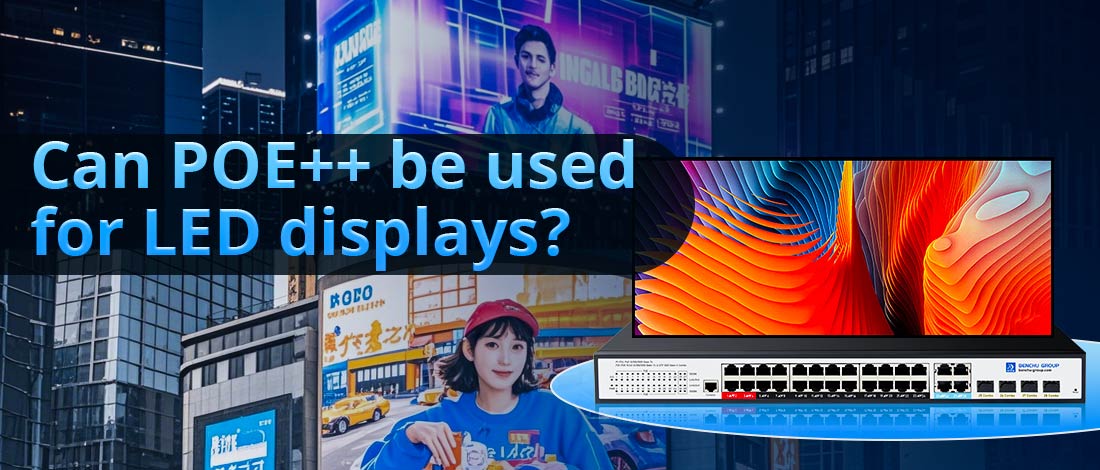
نعم، يمكن استخدام PoE++ (Power over Ethernet Plus Plus) لتشغيل شاشات LED، بشرط أن تقع ضمن مواصفات ومتطلبات توصيل الطاقة الخاصة بها. يعد تطبيق PoE++ جذابًا بشكل خاص في البيئات التي تعتبر فيها البساطة والكفاءة والمرونة أمرًا بالغ الأهمية. فيما يلي وصف تفصيلي لكيفية دعم PoE++ لشاشات LED:
1. توصيل الطاقة الكافي
بو++ (كما هو محدد بواسطة IEEE 802.3bt) يمكن أن يوفر ما يصل إلى 90 وات لكل منفذ، وهو أعلى بكثير من معايير PoE السابقة. شاشات LED، وخاصة اللوحات الصغيرة أو المتوسطة الحجم مثل:
--- اللافتات الرقمية في متاجر التجزئة أو المكاتب.
--- لوحات تفاعلية للفصول الدراسية أو قاعات المؤتمرات.
--- شاشات العرض الذكية في أنظمة التشغيل الآلي للمباني. يمكن أن تعمل عادةً ضمن نطاق الطاقة هذا.
بالنسبة إلى لوحات العرض LED الأكبر حجمًا التي تتطلب قوة كهربائية أعلى، يمكن النظر في منافذ PoE++ المتعددة أو الحلول الهجينة.
2. التثبيت المبسط
تتطلب شاشات LED التي تعمل بتقنية PoE++ كابل Ethernet واحدًا فقط من أجل:
--- توصيل الطاقة: يلغي الحاجة إلى منافذ الطاقة القريبة أو الأسلاك الكهربائية.
--- نقل البيانات: حمل المحتوى أو التعليمات إلى الشاشة، مثل خلاصات الفيديو أو الأوامر.
تقلل هذه البساطة من تعقيد التثبيت وهي مفيدة بشكل خاص في:
--- الأماكن التي يكون فيها تشغيل الأسلاك الكهربائية المنفصلة مكلفًا أو غير عملي.
--- المنشآت المؤقتة مثل أماكن الفعاليات أو المعارض التجارية.
3. تعزيز المرونة
يسمح استخدام PoE++ بوضع شاشات LED في المواقع التي قد تكون فيها حلول الطاقة التقليدية محدودة. على سبيل المثال:
--- يمكن تركيب شاشات العرض على الجدران أو الأسقف أو المناطق الخارجية دون الحاجة إلى مصادر طاقة قريبة.
--- أصبح نقل شاشات العرض وإعادة تشكيلها أسهل، حيث لا توجد حاجة لتعديل البنية التحتية الكهربائية.
4. إدارة الطاقة والبيانات المركزية
باستخدام PoE++، يمكن إدارة جميع شاشات LED من خلال مفتاح أو وحدة تحكم مركزية، مما يوفر ما يلي:
--- المراقبة عن بعد: يمكن للمسؤولين التحقق من حالة الطاقة واتصالات البيانات الخاصة بالشاشة.
--- كفاءة الطاقة: يمكن تحسين الطاقة أو قطعها عن شاشات العرض غير المستخدمة عن بعد.
--- قابلية التوسع: يمكن دمج شاشات العرض الإضافية بسلاسة في النظام دون الحاجة إلى إعادة توصيل الأسلاك بشكل كبير.
5. تحسين كفاءة الطاقة
يوفر PoE++ بطبيعته إدارة أفضل للطاقة مقارنة بإعدادات الطاقة التقليدية، وهو أمر مناسب بشكل خاص لشاشات LED:
--- تقنية LED نفسها موفرة للطاقة، ويكمل PoE++ ذلك من خلال توصيل الطاقة الأمثل.
--- يمكن لأنظمة PoE++ مراقبة استهلاك الطاقة وضبطه ديناميكيًا، مما يقلل من هدر الطاقة.
6. السلامة والامتثال
تعتبر السلامة أولوية في أي نظام لتوصيل الطاقة:
--- عملية الجهد المنخفض: يعمل PoE++ بجهد منخفض (أقل من 60 فولت)، مما يقلل من مخاطر المخاطر الكهربائية.
--- كشف الجهاز: مفاتيح بو ++ توصيل الطاقة فقط للأجهزة المتصلة والمتوافقة، مما يضمن سلامة شاشات LED المتصلة.
--- الحماية من الطفرة: يحمي كلاً من شاشة LED والبنية التحتية للشبكة من الاندفاعات الكهربائية.
7. حالات الاستخدام المناسبة لـ PoE++ في شاشات LED
بيئات البيع بالتجزئة: تشغيل اللافتات الرقمية الديناميكية للإعلان أو معلومات المنتج.
المباني الذكية: تشغيل لوحات العرض والتحكم بها في الردهات أو غرف الاجتماعات.
مواصلات: شاشات إعلامية في محطات الحافلات أو محطات القطار أو المطارات.
الرعاية الصحية: شاشات مراقبة المرضى أو الأدلة الرقمية في المستشفيات.
تعليم: شاشات تفاعلية للفصول الدراسية أو الممرات.
8. القيود التي يجب مراعاتها
على الرغم من أن PoE++ متعدد الاستخدامات، إلا أن هناك بعض الاعتبارات:
--- حدود الطاقة: غالبًا ما تتجاوز جدران الفيديو LED الكبيرة أو شاشات العرض الخارجية عالية السطوع حد 90 وات لكل منفذ وقد تتطلب حلول طاقة تقليدية أو مصادر طاقة إضافية.
--- مسافة الكابل: يصل النطاق الفعال لـ PoE++ إلى 100 متر (328 قدمًا) مع كابلات Cat5e أو كابلات أفضل. أبعد من ذلك، هناك حاجة إلى أجهزة إعادة إرسال الإشارة أو حلول بديلة.
خاتمة
يعد PoE++ حلاً ممتازًا للطاقة والبيانات للعديد من أنواع شاشات LED، خاصة في عمليات النشر الصغيرة والمتوسطة الحجم أو البيئات التي تعتبر فيها البساطة والمرونة وفعالية التكلفة أمرًا بالغ الأهمية. إن قدرات الإدارة المركزية، جنبًا إلى جنب مع كفاءة الطاقة المتأصلة وسلامة PoE++، تجعلها خيارًا مثاليًا لأنظمة العرض الرقمية الحديثة. بالنسبة للتطبيقات واسعة النطاق أو عالية الطاقة، لا يزال بإمكان PoE++ لعب دور في الأنظمة الهجينة أو تكملة مصادر الطاقة التقليدية.